|
Ding-Donging Merrily
For legal reasons I have been unable to attend any of the Christmas parties thrown by publishers this year, but I did make the arduous strike-affected journey to London to make my presence felt at the Shots end-of-term festivities in the magazines slightly over-decorated offices.

I was determined not to miss the event as it marked a return to the social scene of my fellow boulevardier ‘Prince’ Ali Karim, whose youthful good looks and enthusiasm for crime fiction often bely his great age. It also proved a special occasion for Shots editor Mike ‘Tombstone’ Stotter who managed to get his hands on the first copy of Peter (no nickname) Guttridge’s The Brighton Trilogy which is to be available in a single volume early next year.
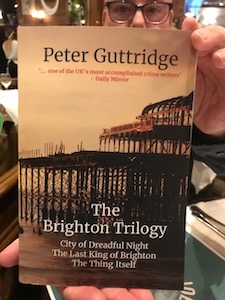
It was 20 years ago today
In December 2003 I was just about recovered – well, at least I was mobile – from a stroke and a major part of my rehabilitation had been reviewing crime fiction for the Birmingham Post, having taken over the ‘Crime File’ column from the late Bill Pardoe.
My main recommendation for that month was Pompeii by Robert Harris, if only out of curiosity as to how the author could make a mystery out of a situation which everyone knows is going to end in tears, fire and ash. I was also intrigued by the strain of political anger which rippled through Absolute Friends by John Le Carré, the author making no secret of his views on the Blair/Bush alliance and the war in Iraq. I also picked out publisher Orion for producing (without fanfare) The Scared Stiff, the 85th novel of American mystery Grand Master Donald Westlake, whilst launching a major promotion called New Blood featuring novels by nine new crime writers: five American, three British and one Italian. Of those nine debutants, I prophesied, some would disappear without trace but two or three would prosper. In this latter category, I flagged up the book Judgement Calls by Alafair Burke and for once I was not wrong.
Old Dog, Same Old Tricks
In order to keep me off the streets following my retirement from the Getting Away With Murder column, the editor of Shots has agreed to host Ripster Revivals, an occasional series of essays discussing authors or books I have discovered or re-discovered now I have been freed from the tyranny of reviewing the tsunami of new crime and thriller titles. As one previously loyal reader put it: ‘So just old stuff then?’ Well, perhaps so, but then I am very old and fortunate to have read some great books along the way. So why not celebrate them?
The first Ripster Revivals featured the urbane British crime writing of the late Peter Dickinson and struck a chord with George Easter, editor of the American magazine Deadly Pleasures.

It not only provoked George into digging into his own collection of Peter Dickinson’s ‘Jimmy Pibble’ books (and Dickinson wrote a lot of other fiction in different genres), but he immediately offered to syndicate Ripster Revivals in Deadly Pleasures.
The second feature in the series looks at American thriller (and travel) writer David Dodge and is now posted in Shots.
From Russia With A-Levels
A long time ago in what seems like a galaxy far, far away, I took a special A-level exam in the history of the Russian revolution. My teacher on that course was Tom Sharpe, the author of Riotous Assembly and Porterhouse Blue, who flavoured his lectures with many ‘eye-witness’ stories of events in Russia as told to him – he said – by his teacher, Arthur Ransome, who was certainly in Petrograd at the right time and was suspected of being a British spy by Bolsheviks and a Bolshevik spy by the British. If Ransome was a spy, I don’t think either side got their money’s worth, though he was well-connected, ostensibly as a foreign correspondent but also involved in a love affair with one of Trotsky’s secretaries, though of course most people only think of him now as the author of Swallows and Amazons.
Anyhow... the stories Tom Sharpe told, particularly the gruesome ones about White and Red atrocities during the Civil War, certainly livened up his lessons and gave me an abiding interest in that confused and chaotic period which turned out to have such an impact on the history of the twentieth century. (It also started my reviewing career as Tom’s second novel, Indecent Exposure, was the first novel I ever reviewed – for a student newspaper – which ensured decent grades when it came to essays being marked.)
This year I dived back into the turmoil of the period thanks to two excellent reads.
Antony Beevor’s exhaustive military history Russia: Revolution and Civil War 1917-1921, came out in paperback [Weidenfeld and Nicolson] is as authoritative and detailed as one might expect for Britain’s leading, and best-selling, military historian. Essential reading for anyone needing to sort their Bolsheviks from their Mensheviks, their Left SRs from the Kadets or who get Kornilov and Kolchak mixed up (a common mistake).
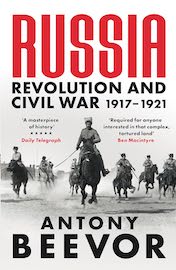
Examining just one segment of this epic story – the intervention in the Russian Civil War by the western powers 1918-1920 – is Anna Reid’s wonderfully readable A Nasty Little War [John Murray], which sheds light on a little known bit of unsavoury history and is highly recommended.
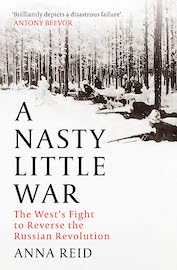
Both Beevor and Reid mention the minor (very minor) role in these tumultuous events played by Arthur Ransome and Reid also quotes a British general who advocated that Ransome ‘should have been shot’. But then, there would have been no Swallows and Amazons.
In Bondage
Having oodles of time to surf the second-hands book sites on the jolly old interweb, I come across forgotten authors, books I never knew about and, initially, titles I couldn’t quite believe.
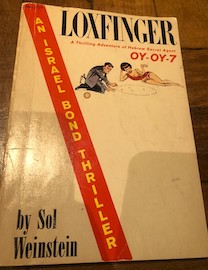
Described as the adventures of ‘Hebrew Secret Agent Oy-Oy-7’ Loxfinger by Sol Weinstein was published in the US (but not, I think, in the UK) in 1965 at the height of the James Bond craze which spawned many an imitation. I do not think this was intended as anything but a comic send-up of Bond and was probably successful as a one-off spoof, but when I mentioned it to a well-known collector of Bond books, he informed me that Loxfinger was only the first in a series featuring Oy-Oy-7 which included: Matzoball, On the Secret Service of His Majesty the Queen (?!) and You Only Live Until You Die.
Be Upstanding
I notice that for Crimefest 2024, the role of Toastmaster (or Toastrix) at the convention’s gala dinner has been changed to Leader of Toasts, which I believe is an almost accurate translation from the German Trinkspruchführer.
Stocking Filler
For the Agatha Christie fanatics who simply can’t get enough, but have read all her books, the ideal stocking-filler this Christmas is probably Agatha Christie: Plots, Clues and Misdirections [The Book Guild], which sort of does what it says on the tin, or in this case, the title page.
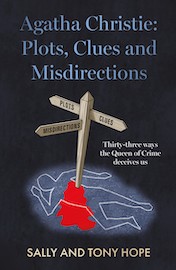
It is clearly a labour of love by retired medical doctors (and the doctor didn’t always do it) Sally and Tony Hope, who have been Christie fans for forty years and who read all of her sixty-six crime novels three times before writing this book. There is a certain amount of repetition in their analysis of the Great Dame’s plots and constant reminders that Agatha was “a creative artist” though it is never clear whether this refers to a genius imagination or the occasional lapse of concentration. The Hopes’ dissection of Christie’s whodunits does not extend to her output of thrillers, which is a pity as I was really hoping somebody – anybody – would explain Passenger To Frankfurt to me.
Smiley’s People
To my great delight I have discovered that guided tours of Cambridge on the theme of ‘Spies, Lies and Double Dealing’ now take place and one of the Green Badge guides is an old family friend, Sophie Smiley, the daughter of philosophy Don Tim Smiley who introduced me to the novels of Margery Allingham more than fifty years ago.

Yet rather than concentrate on the famous Cambridge ring of Philby, Burgess, Maclean and Bunt et al, this guided tour goes back to Elizabethan times, retracing the steps of Christopher Marlowe, among others, as well as the government agents sent to keep an eye on the unruly and possibly heretical students. It is a fascinating look into the shady corners of Cambridge’s rich history of spying, and with guide called Smiley, who could resist?
Italian Afterlife
I have made no secret of my attempts to learn Italian one television crime series at a time and my current binge-watching treats (with sub-titles OFF) are set in 1930s Naples and present-day Trieste, both star Lino Guancale as the leading character and both involve ghosts.
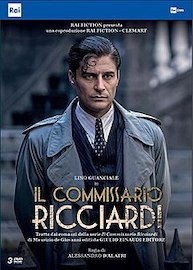 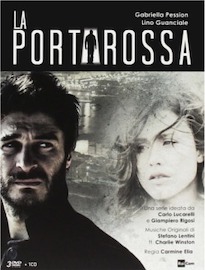
In Il Commissario Ricciardi, Guancale plays a Naples police detective working under a fascist government (from the books by Maurizio Di Giovanni) who can see the ghosts of victims of violent death. In La Porta Rossa, he is a maverick Trieste police detective who is murdered in Episode One and spends the rest of the series, and two succeeding series, as a ghost, solving his own murder and then subsequent crimes. ‘The Red Door’ – for those who need sub-titles – is the door our ghostly detective must pass through to find eternal piece. Sounds daft, I know, but it is stuffed with (Italian) police procedure, Trieste is an interesting place (though it is not sugar-coated to attract tourists), and the original idea came from another fine Italian crime writer, Carlo Lucarelli.
Farewell To Berlin?
What has happened to the sixth book in Volker Kutscher’s ‘Babylon Berlin’ series?
I was fully expecting Lunapark to finally see publication in English this year as it came out in German in 2018, but so far there is no sign of it, only a trail of confusion.
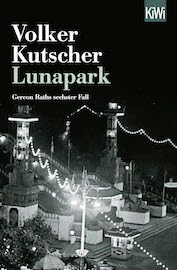
A year or so ago, Kutscher’s English publishers launched a crowd-funding exercise to pay for the book to be translated, which the more cynical may have raised an eyebrow at given the sales of previous titles and the presumed royalties from the big-budget television adaptation (though I have never pretended to understand publishing contracts). Whatever the financial circumstances surrounding the book, the ‘Kickstarter’ appeal failed to reach the £10,000 target and was pulled earlier this year. Since then, nothing.
|
|
Picks of the Year
2023 was a strong year for spy fiction but one of the best historical novels, which was also about spying, was Moscow Exile by John Lawton [Grove Press], a forensic dissection of the motives and actions of people caught up in the Cold War and the ‘un-American activities’ paranoia; active belligerents, innocent bystanders and political schemers. Beautifully written and cut with flashes of sardonic wit, it is, nominally, the fourth of Lawton’s ‘Joe Wilderness’ novels, but also features members of the Troy family from his primary series which has been delighting the discerning reader for more than twenty-five years now and as a body of work, is shaping up to be one of the most impressive achievements in spy-fi.
On the crime fiction front, I found the most memorable titles to be American and out in front (by a whisker) was Small Mercies by Dennis Lehane [Abacus], a compelling, convoluted saga of revenge, families and tribal rivalries set in 1974 Boston. The stresses and strains of domestic life in an Irish immigrant community dominated by a criminal kingpin has proved a happy hunting ground for many American crime novelists, but nobody does it better than Lehane.
S.A. Cosby has rapidly established himself as a major player in crime fiction and his novel All The Sinners Bleed [Headline] puts a new twist on the serial-killer thriller with a black sheriff in backwater Virginia struggling against a racist community as well as an inventive murderer. As a serial-killer-thriller, All The Sinners Bleed is up there with Silence of the Lambs, but as a crime novel which peels back the onion-layers of racism and bigotry in the southern states, it is in a class of its own. Simply superb.
For an uncompromising slice of country noir, look no further than Ozark Dogs by Eli Cranor [Headline]. The country in question is blighted with rust-coloured towns, redundant nuclear plants and junkyards, and the population blighted by poverty, drugs, prostitution and the Ku Klux Klan. Family feuds and an abundance of weaponry don’t make life any easier.
Part murder mystery, part conspiracy theory thriller, A Line in the Sand by Kevin Powers [Sceptre] has its roots in the war in Iraq. An Iraqi translator for the US army, trying to make a new life in America, may have witnessed something which jeopardises the prospects of military contractors and their continued billion-dollar funding, so he must be eliminated. As spies and hit-men circle, he is defended by, among others, a wonderfully-drawn career policewoman who in theory should be out of her depth, but thankfully isn’t.
Any book which takes its title from a famous Django Reinhardt number gets my attention. In Viper’s Dream by Jake Lamar [No Exit], Clyde ‘The Viper’ Morton moves from rural Alabama to Harlem in 1936 in the hope of making it as a jazz trumpeter. He doesn’t, but does establish himself as a major dealer in the growing marijuana market. Over the next twenty years the Viper becomes a powerful gangster, protecting his trade in ‘weed’ against the growing popularity of heroin among jazz musicians as swing music is supplanted by the bebop generation, which in turn is threatened by rock-and-roll. Several jazz legends appear in person - Miles, Dizzy, Thelonius et al and there is even a small cameo, when the Viper’s trade expands to Hollywood, for Robert Mitchum. Hard-boiled, but also achingly tender, this is a tour-de-force of jazz noir – if that’s a thing; and if it isn’t it should be.
If you like your genres slightly bent, then do try Calico by Lee Goldberg [Severn House] which combines the police procedural with the western thanks to time travel! It shouldn’t work but thanks to a righteous female lead character, some clever writing which sustains the suspense and the odd sly wink at the Back To The Future franchise, it does.
On the non-fiction front, the pick of the year accolade (and probably a medal for bravery) should go to Steven Powell for Love Me Fierce In Danger [Bloomsbury] his biography of James Ellroy, the self-proclaimed ‘demon dog’ of American literature. Love or hate him or his fiction, the deliberately outrageous Mr Ellroy (a self-confessed peeping tom and ‘panty-sniffer’ as well as a would-be Nazi and unrepentant sex-pest) has revealed all, you would hope, his darkest indiscretions himself over the years in interviews and at literary events, where he often behaved disgracefully and to his credit, Powell does not shy away from that side of a crime-writing genius.
My pick of many a notable reissue in 2023 is undoubtedly David Brierley’s Big Bear, Little Bear in a new edition from Brash Books. A superb stand-alone thriller set at the start of the Cold War, and Cold War is also part of a republication of all Brierley’s ‘Cody’ series.

Twenty-five years ago this month I was asked by the Daily Telegraph to do this very exercise and pick my crime novels of 1998. It seems to have been a good year as my choices were: A Long Finish by Michael Dibdin, Last Rites by John Harvey, The Hanging Garden by Ian (still a Commoner) Rankin, The Breaker by Minette Walters and, top pick by a whisker, On Beulah Height by Reginald Hill.
Non-Crime Non-Fiction of the Year
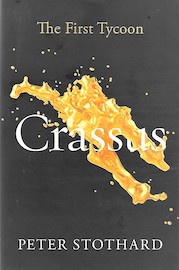 Freed from the shackles of strict Shots deadlines, I have been catching up on some notable non-fiction. Freed from the shackles of strict Shots deadlines, I have been catching up on some notable non-fiction.
Peter Stothard’s short, punchy biography of (Marcus Licinius) Crassus [Yale University Press] tells the story of Rome’s richest man, famous, or notorious, for putting down the slave rebellion lead by Spartacus – and being played by Laurence Olivier in the film. At a crucial point in the history of the Roman republic, Crassus was part of a political triumvirate with Pompey and Julius Caesar, though ultimately it did not end well for any of them. The meeting where that ‘triumvirate’ pact was drawn up took place in the Tuscan town of Lucca, which Stothard, or perhaps his American editors, insist on spelling Luca. Apart from that, a fascinating study of one of the first tycoons and an object lesson in what happens when egotistical billionaires take to politics.
Still in the ancient world, Twilight Cities by Katherine Pangonis [Weidenfeld & Nicolson] is a whistle-stop tour of five important but now ‘forgotten’ cities which once were significant political and economic centres of civilisation around the Mediterranean: Tyre, Carthage, Syracuse, Ravenna and Antioch. This is a very informative historical and cultural guide, clearly written with a deep love of the subject. My only quibble is that Ravenna’s role as a major naval base for Imperial Rome is somewhat understated, but that’s just me and it did not spoil an engaging read which taught me a lot.
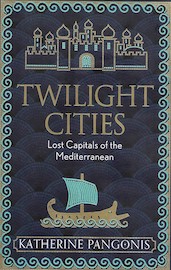 
You’ve seen the films – both Leslie Norman’s excellent 1958 version and the more recent Christopher Nolan take – on the ‘miracle of Dunkirk’ or the really Great Escape, and now you can read what the Germans thought in Robert Kershaw’s Dünkirchen 1940 [Osprey]. Interspersed with the military tactics are fascinating insights into what was going on in the German high command as well as among the foot-soldiers, often on pep-pills, who found themselves fighting across famous old battlefields, not just from the First World War, but back to the victories of Marlborough and even Henry V. A fascinating, sobering read which puts a different perspective on what we, in this country, regard as a heroic story we know by heart.
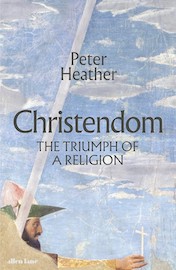
I am greatly looking forward, having only just started it, to reading Peter Heather’s Christendom – The Triumph of a Religion [Allen Lane] as I greatly admired his Fall of the Roman Empire and find him, along with Tom Holland, one of the best of an impressive crop of historians who can bring the ancient world to life.
New Year’s Resolutions
I never make New Year’s resolutions, apart from the one about not having another stroke, as I never manage to keep them. I am, however, resolved to pre-order two books due out in 2024, as they are by dear friends who know where I live.
I first met Justin Scott thirty years ago at a crime fiction convention in the company of Iain Pears and Julia Wisdom, our mutual editor at (Harper) Collins. Since then, Justin has kept in touch and whenever he crossed the Atlantic tried to teach me the finer points of a game called pool, which I soon discovered was best not played for money, or tempt me to lunch after smuggling me into his exclusive London club.
 
It was the Getting Away With Murder column which ‘outed’ Justin by revealing that he was also Paul Garrison, the author of some red-blooded sea-going thrillers, but long before that I was a fan of Justin’s own thrillers (often historical, usually with a salt tang sea-spray about them), his crime series featuring Ben Abbott and his co-authorship, with Clive Cussler, of the Isaac Bell series. For his new novel, he is back in London, but the London of 1600, where William Shakespeare gets a commission to write a play which might just be the death of him.
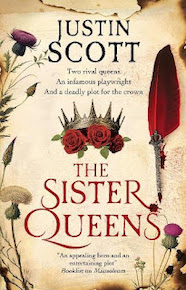
The Sister Queens will be published in February by Severn House and I am looking forward to it immensely.
Having been a fan of Ben Pastor’s fabulous ‘Martin Bora’ series of WWII thrillers for many years, I am delighted to hear that the latest instalment is to be published in July 2024 by Bitter Lemon Press. It is the eighth novel to feature the aristocratic German soldier (turned reluctant detective) to appear in English, although I believe there are several still hiding in Verbena Pastor’s Italian backlist – and, yes, that’s a hint and I have frequently nagged the author about it over lunches in London, Milan and, as here, Florence before we start arguing about our other mutual interest, archaeology.

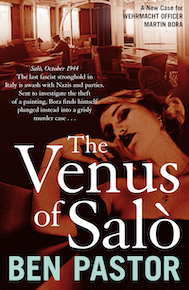
The Venus of Salo is set in 1944, with Bora transferred to Salo on Lake Garda, where a deposed Mussolini seemed to be planning a dramatic last stand, though it didn’t end well. (But then last stands normally don’t.)
New Year Recommendations
To use an old cliché, I would normally say I would buy a new Paul Vidich thriller ‘sight unseen’ but in the case of Beirut Station I do not have to as his most excellent publisher, No Exit Press, have already sent me an advance copy and what a superb piece of spy fiction it is.
Vidich has been highly, and rightly, praised for spy stories set in the Cold War but Beirut Station throws the reader into the hot and dirty war between Israel and Hezbollah militants in the Lebanon in 2006. A CIA plot to assassinate a Hezbollah leader criss-crosses with a suspected Hezbollah plot to assassinate visiting US Secretary of State Condoleezza Rice and caught in the middle is a young female CIA officer struggling with split loyalties and a possible mole high up in the CIA. Cool, knowing and full of credible tradecraft (car bombs a speciality), Vidich is up there on the top table of thinking-man’s spy writers.
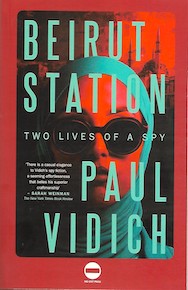 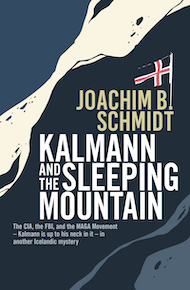
Based on his first appearance last year, I am looking forward to a second outing for one of the most unusual detectives in crime fiction when Kalmann and the Sleeping Mountain by Joachim B. Schmidt is published by Bitter Lemon next July. The eponymous hero, Kalmann, is thought by many of his fellow Icelanders to be several cod short of a catch but they usually look kindly on his role as the self-appointed (and totally unofficial) ‘sheriff’ of small, almost deserted fishing village.
Without doubt one of the most unlikely crime-fighters around, Kalmann is by turns frighteningly innocent, frighteningly stupid and simply frightening, but Joachim Schmidt tells his story with gentle humour and heart-warming sympathy.
Two more to watch out for in 2024 based on what I have heard on my withering grapevine:.
Farewell Dinner for a Spy [Arcadia] is the latest in Edward Wilson’s series to feature his spy hero William Catesby, the setting this time being post-war France and Laos. I am ashamed to say I am unfamiliar with the work of Edward Wilson, which is doubly embarrassing as, although a native of Baltimore, he long ago adopted British citizenship and has the good taste to now live in East Anglia.
Caroline Tudor does not herself scare me, but her books, written as C.J. Tudor, certainly do. With The Gathering [Michael Joseph] in April, she has moved away from stock crime fiction and more into mainstream horror, successfully invading Stephen King/Richard Matheson territory. The small town in Alaska called Deadheart (the clue really should have been in the name) co-exists with a colony of ‘vampyrs’ who are a protected species of non-human animal life, though that doesn’t stop illegal hunting and trophy-taking. It’s not going to end well. (I would have loved to have been told how federal legislation to protect ‘vampyrs’ had gone down in some of the States in the Bible Belt.)
Angels in Asia
I am indebted to a globe-totting fan with too much time on her hands for sending me this candid snap of an unusual promotional item outside a second-hand bookshop in Ho Chi Minh City, which I am told is still called Saigon.

I am also intrigued as whenever I have asked someone from Vietnam what it was like reading one of my old paperbacks, they have simply answered: You weren’t there, man!
Mery Crimble
The Ripster
|